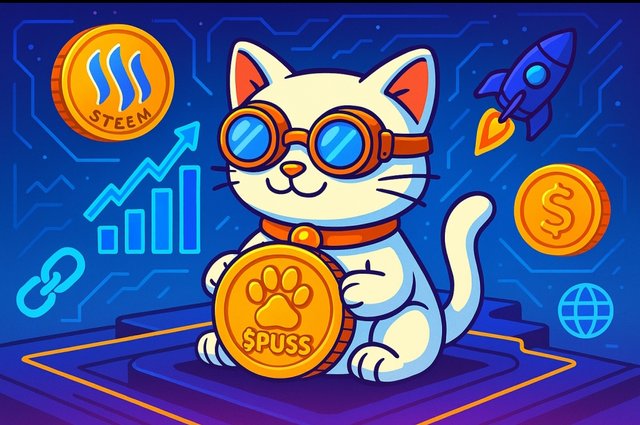Data Marketplaces Powered By PUSS Coin
INTRODUCTION
The decentralized nature of blockchain technology has opened up new opportunities for data ownership and monetization. PUSS Coin uses blockchain consensus to make sure of the integrity of data, preventing false data via trust generated by consensus mechanism at blockchain, and establishes a foundation for secure, peer-to-peer transactions between users that do not require costly central authorities systems, which may be slow or biased.
PUSS Coin’s marketplace enables cross-industry & intra-industry exchanges through standardized smart contract practices. This approach promotes interoperability between different sectors such as finance, healthcare, and logistics, enabling a shared environment for data exchange. Businesses benefit from greater efficiency, reduced friction, and the ability to collaborate through a unified infrastructure that respects data rights while promoting innovation.
To maintain security and permanence, data is stored on decentralized platforms such as IPFS, which reduces the risk of tampering or central failures. The marketplace governance is done through a DAO, where the community can collectively define the policies and resolve disputes. This community-driven model makes sure of transparency and aligns incentives across all participants, from data providers to consumers.
DATA VERIFICATION VIA BLOCKCHAIN CONSENSUS
PUSS Coin uses blockchain consensus to verify whether the data shared is real or fake. Every data that gets submitted in our marketplace are being written immutable and timestamped into blockchain. Validators in the network will vouch whether the data submitted are true and genuine or not, thereby no fraud or manipulation can happen between data buyer and sellers throughout our ecosystem.
Verified data is a must for organizations depending on data of high quality. Thanks to the blockchain based consensus, a dataset needs to be verified by multiple validators before it can be traded. This decentralized verification mechanism not only reduces the reliance on central entities, but also renders the process transparent, verifiable and fair as in decentralized market places.
Also, the verification is efficient and scalable. Instead of manual reviews or centralized authorization systems, PUSS Coin’s consensus mechanism allows verifications through smart contracts readily and automatically. Therefore, the data suppliers can have their data approved faster while the data consumers have higher confidence in what they purchase or what they integrate into their systems.
CROSS-INDUSTRY DATA EXCHANGE USING A COMMON PROTOCOL
PUSS Coin allows organizations to exchange data across industries using same blockchain protocol. Health can trade with Finance, Agriculture can exchange with llogistics and vice versa as applicable under same rules. This encourages working together and creates one single market place for data thereby even breaking data silos effectively.
Industries often lock data in proprietary silos. PUSS Coin addresses this by introducing a standard smart contract that allows reading, verifying and using data across applications and even industries. This makes the adoption of innovation especially within areas where AI has an impact possible. AI needs many diverse sources to be trained properly.
The introduction of data exchange standards also enables plug-and-play interactions – companies can buy into ecosystem without integration costs - which also lowers barriers for small enterprises and start-ups to access and be part of the new digital economy because one Protocol will rule them all, on the blockchain.
SECURE DATA STORAGE ON IPFS OR DECENTRALIZED CLOUDS
Data in the PUSS Coin marketplace isn’t just traded — it’s stored securely using decentralized networks like IPFS. The data isn’t stored on a centralized server that can go down or become compromised via attack or censorship — it’s instead broken into pieces and distributed across nodes.
Decentralized storage also saves money. Users will be charged for what they actually use not for an infrastructure with expensive cost. Smart contract is assigned to connect the access of storage and payment, so that only authorized buyer can buy the data set and keep it private while accessing storage in block chain.
By using IPFS or decentralized cloud there are more chances of getting long-term value. Provider can put/upload the data into IPFS or decentralized cloud as long as they want without depending on a centralized platform which may shut down or lose the data file. Combined with PUSS Coin’s blockchain backbone, this setup creates a strong, secure environment for digital asset exchange.
DAO GOVERNED MARKETPLACES FOR COMMUNITY OVERSIGHT
PUSS Coin’s data marketplace is managed by a decentralized autonomous organization (DAO), giving users a voice in governance. Through DAO voting, stakeholders decide on listing policies, dispute resolutions, data quality standards, and fee adjustments. This democratic system makes sure of fairness, transparency, and long-term alignment with community values.
DAO governance eliminates gatekeeping where centralized managers approve who can enter or what data are valuable. The community selects proposals with respect to collective interest, which attracts more diverse participants, supports local data producers and enforces decentralization—thus returning platform ownership to users.
Transparency is guaranteed when everything is visible on-chain. All people can check how rules were made or modified. In the growing data ecosystem, DAO governance grants upgradeability while ensuring fairness. Trust not control makes other agents (e.g., data suppliers and consumers) willing to participate.
CONCLUSION
In the PUSS Coin-powered data marketplace, a decentralized ecosystem for trust, accessibility and transparency is achieved. The blockchain consensus for verification of data, common protocol for cross-industry data exchange, secure decentralized storage and DAO-driven governance make sure that we are doing sustainable, fair and future-ready data commerce. It’s a blueprint or our open digital economy.



https://x.com/Memephiz148421/status/1926139699950690393
https://x.com/Memephiz148421/status/1919432393728901390
https://x.com/Memephiz148421/status/1919430052954923220
https://x.com/Memephiz148421/status/1919429726784930298
https://x.com/Memephiz148421/status/1919429211942453534
Upvoted! Thank you for supporting witness @jswit.
Note:- ✅
Regards,
@jueco